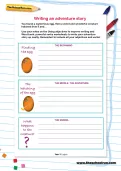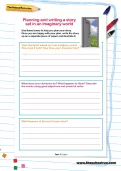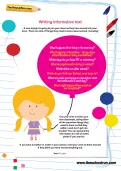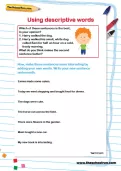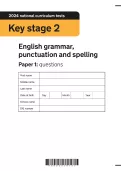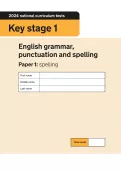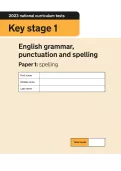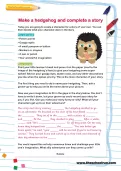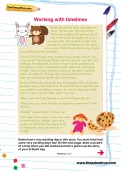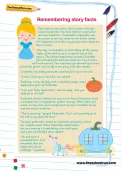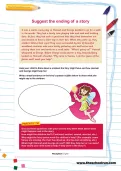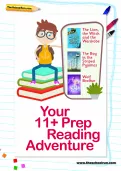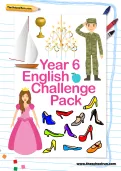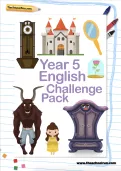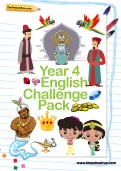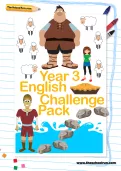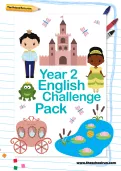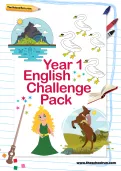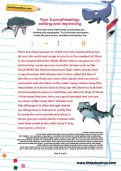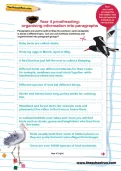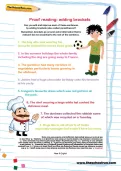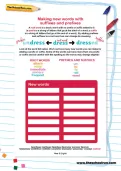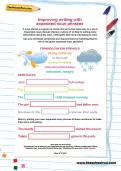Help your child prepare for the Year 6 English SATs, taken at the end of Key Stage 2, with some revision and at-home practice. These KS2 SATs past papers from 2024 are the official past papers from the Department for Education, used in schools.
or
Register to add to your saved resources
Help your child prepare for the optional English KS1 SATs, taken at the end of Year 2, with some at-home practice. These complete Y2 SATs past papers from 2024 are the official Department for Education papers used in schools.
or
Register to add to your saved resources
Help your child prepare for the English KS1 SATs, taken at the end of Year 2, with some at-home practice. These complete Y2 SATs past papers from 2023 are the official Department for Education papers used in schools.
or
Register to add to your saved resources
Today you are going to create a character for a story of your own. You can then decide what your character does in the story. Get ready for some prickly fun!
or
Register to add to your saved resources
Listen to a story about Sasha's exciting day, then tell a story about a brilliant day you've had in pictures!
or
Register to add to your saved resources
Already a subscriber? to view this content.
How good is your memory? Listen to this popular story then see if you can remember some of these facts from the story.
or
Register to add to your saved resources
Already a subscriber? to view this content.
Help your child read a text and then imagine how it might continue. They'll be taking their first steps into creative writing and story telling!
or
Register to add to your saved resources
Already a subscriber? to view this content.
Reading is an 11+ exam preparation superpower! Each of the 40 books in our 11+ exam prep reading adventure has been chosen to act as a story-filled portal to new vocabulary and will help your child get to grips with challenging texts the fun way – no flashcards required!
or
Register to add to your saved resources
Already a subscriber? to view this content.
Challenging reading comprehensions and activities for Year 6 readers and writers, designed to stretch your child and offer them the opportunity to explore their year-group topics in greater depth.
or
Register to add to your saved resources
Already a subscriber? to view this content.
Challenging reading comprehensions and activities for Year 5 readers and writers, designed to stretch your child and offer them the opportunity to explore their year-group topics in greater depth.
or
Register to add to your saved resources
Already a subscriber? to view this content.
Challenging reading comprehensions and spelling activities for KS2 (Year 4) readers and writers, designed to stretch your child and offer them the opportunity to explore their year-group topics in greater depth.
or
Register to add to your saved resources
Already a subscriber? to view this content.
Challenging reading comprehensions and activities for Year 3 readers and writers, designed to stretch your child and offer them the opportunity to explore their year-group topics in greater depth.
or
Register to add to your saved resources
Already a subscriber? to view this content.
Challenging reading comprehensions and activities for Year 2 readers and writers, designed to stretch your child and offer them the opportunity to explore their year-group topics in greater depth.
or
Register to add to your saved resources
Already a subscriber? to view this content.
Challenging reading comprehensions and activities for Year 1 readers and writers, designed to stretch your child and offer them the opportunity to explore their year-group topics in greater depth.
or
Register to add to your saved resources
Already a subscriber? to view this content.
This information text needs punctuating and dividing into paragraphs. Try to include punctuation marks like semi colons, brackets and dashes, too.
or
Register to add to your saved resources
Already a subscriber? to view this content.
Billy has written a letter to try to persuade his local council that a new park is needed in the area. The language is very informal. Do you think his letter will be taken seriously? Your task is to keep the ideas in the letter the same but rewrite it using the more appropriate formal language that is needed when writing a persuasive letter to someone you don’t know.
or
Register to add to your saved resources
Already a subscriber? to view this content.
Paragraphs are used to split writing into sections; each paragraph is about a different topic. Can you cut out these sentences and organise them into paragraph groups?
or
Register to add to your saved resources
Already a subscriber? to view this content.
Can you edit and improve each of these sentences by adding brackets (also called parentheses)?
or
Register to add to your saved resources
Already a subscriber? to view this content.
Look at the word list. Work out how many new words you can make by adding a prefix or suffix. Some of the words can have more than one prefix or suffix and be careful with the spelling as the words may change slightly!
or
Register to add to your saved resources
Already a subscriber? to view this content.
A noun phrase is a group of words that act in the same way as a noun. Expanded noun phrases improve a piece of writing by adding more information about the noun, making the text more interesting to read. Can you edit these sentences and improve them by matching them to one of the given expanded noun phrases?
or
Register to add to your saved resources
Already a subscriber? to view this content.

